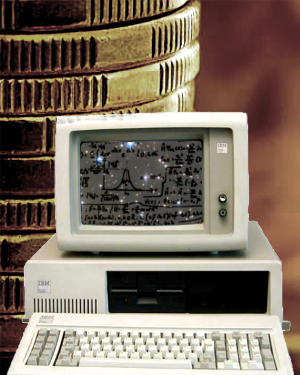CBA banks on quantum future
 The Commonwealth Bank has put $5 million into an effort to build a computer that could changes the world.
The Commonwealth Bank has put $5 million into an effort to build a computer that could changes the world.
The University of New South Wales is on a quest to build the world’s first silicon-based quantum computer.
Such a computer would have mind-boggling data-processing capabilities, which could be turned to anything from medical research and scan to weather forecasting or even economic trend analyses.
CBA’s investment in the centre for quantum computation and communication technology has been signed off by the bank’s new chief information officer David Whiteing, after it was initially raised by the bank’s former tech chief Michael Harte.
The bank is buying early access to developments in the emerging area, as the new centre looks to make the manufacture of quantum computers viable in coming years.
The highly-technical field of quantum computing has leapt from the world of science fiction and made a dash for reality.
The quantum-level approach is different to current or classical computing because it replaces traditional silicon transistors to process data in greater depth that binary ones and zeros allow.
Quantum computers think in qubits, whose bizarre properties mean they can be a one and a zero at the same time, allowing hugely complex calculations to be processed in vastly reduced times.
UNSW research leader Professor Michelle Simmons put the technology in terms a banker might understand.
She said the most common algorithm currently used to protect financial institutions would take about 3000 years to crack using normal methods, but could theoretically be broken in just minutes using a quantum computer.
“The investment is absolutely essential, we are world-leading at the moment but to keep that lead we are literally limited by equipment,” Dr Simmons told Fairfax Media.
“We measure all of our qubits in a dilution fridge, which typically cost about a million dollars. We are competing with groups that typically have four fridges per investigator and we were sitting with four investigators with three fridges last year.”
Commonwealth’s chief information officer David Whiteing admitted the bank had no clear idea of how quantum computing would be used just yet, but the bank realises it will be important enough to get involved early.
“We can hypothesise around what the use cases might be, but the history of technology and computing is that there are always more than you initially imagine,” Mr Whiteing said.
“I fundamentally believe that, to a large extent, technology becomes open source, it is more about execution.
“We accept that other banks may use the technology we have backed, but we need to make sure we can get more advantage by the way we adopt it and being faster to use it.”
The UNSW centre will get funding from the Australian Research Council, but even more will be needed by the time it can commercialise its research.








 Print
Print